BMAF00** Academic Study Skills: Individual Reflection Report
VerifiedAdded on 2023/01/13
|10
|2524
|93
Report
AI Summary
This report is an individual reflection on an Academic Study Skills module, analyzing the achievement of learning outcomes. The student utilizes Kolb's Reflective Cycle to structure their reflection, covering experiences in time management, teamwork, and debate. The report details the application of skills learned, including self-management, communication, and feedback, providing examples from formative assessments and module activities. The student reflects on their strengths, weaknesses, and areas for improvement, particularly in group work and public speaking. The report concludes with an action plan for personal development, emphasizing the skills gained and their relevance to future goals. The assignment adheres to the specified word count and includes references.
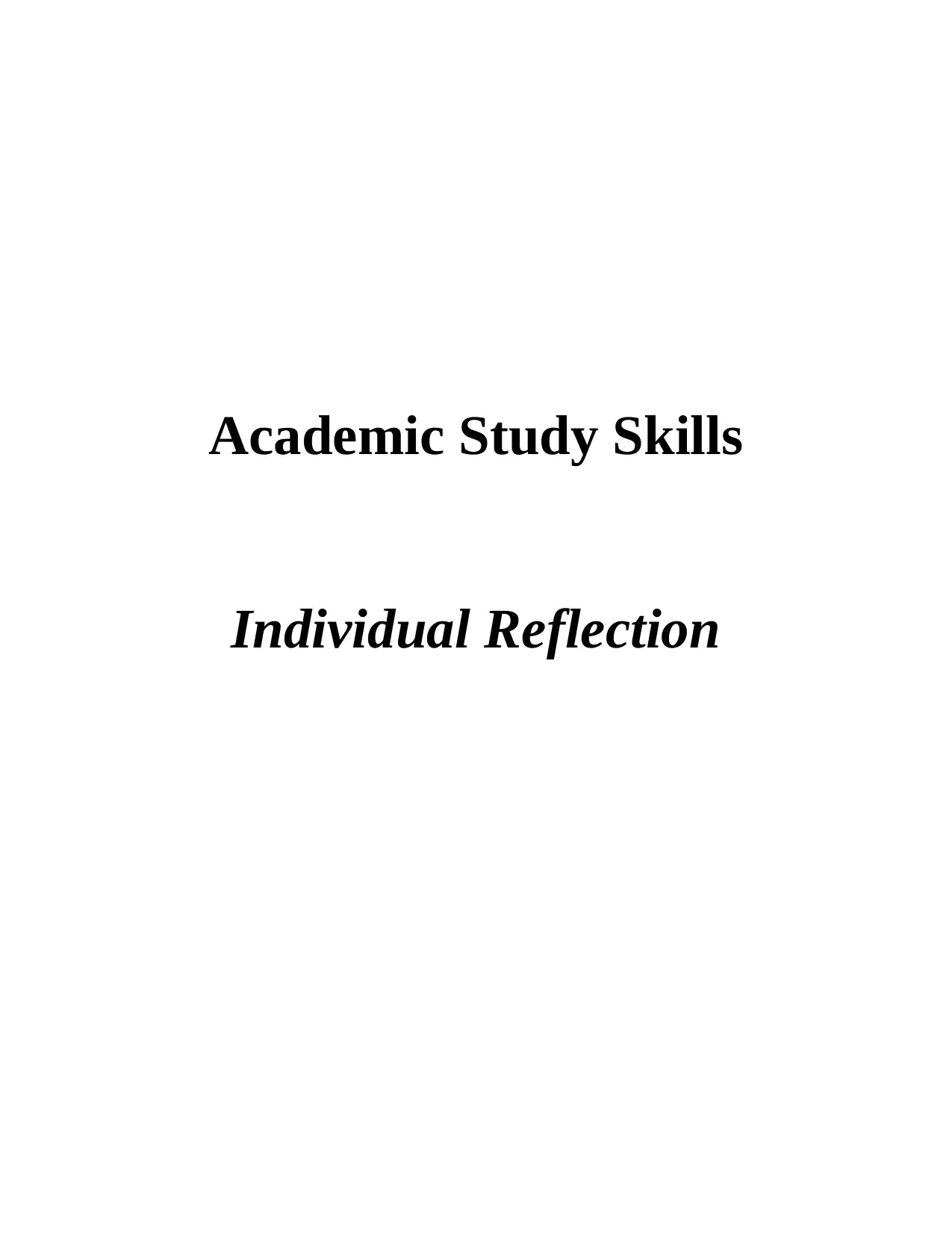
Academic Study Skills
Individual Reflection
Individual Reflection
Paraphrase This Document
Need a fresh take? Get an instant paraphrase of this document with our AI Paraphraser
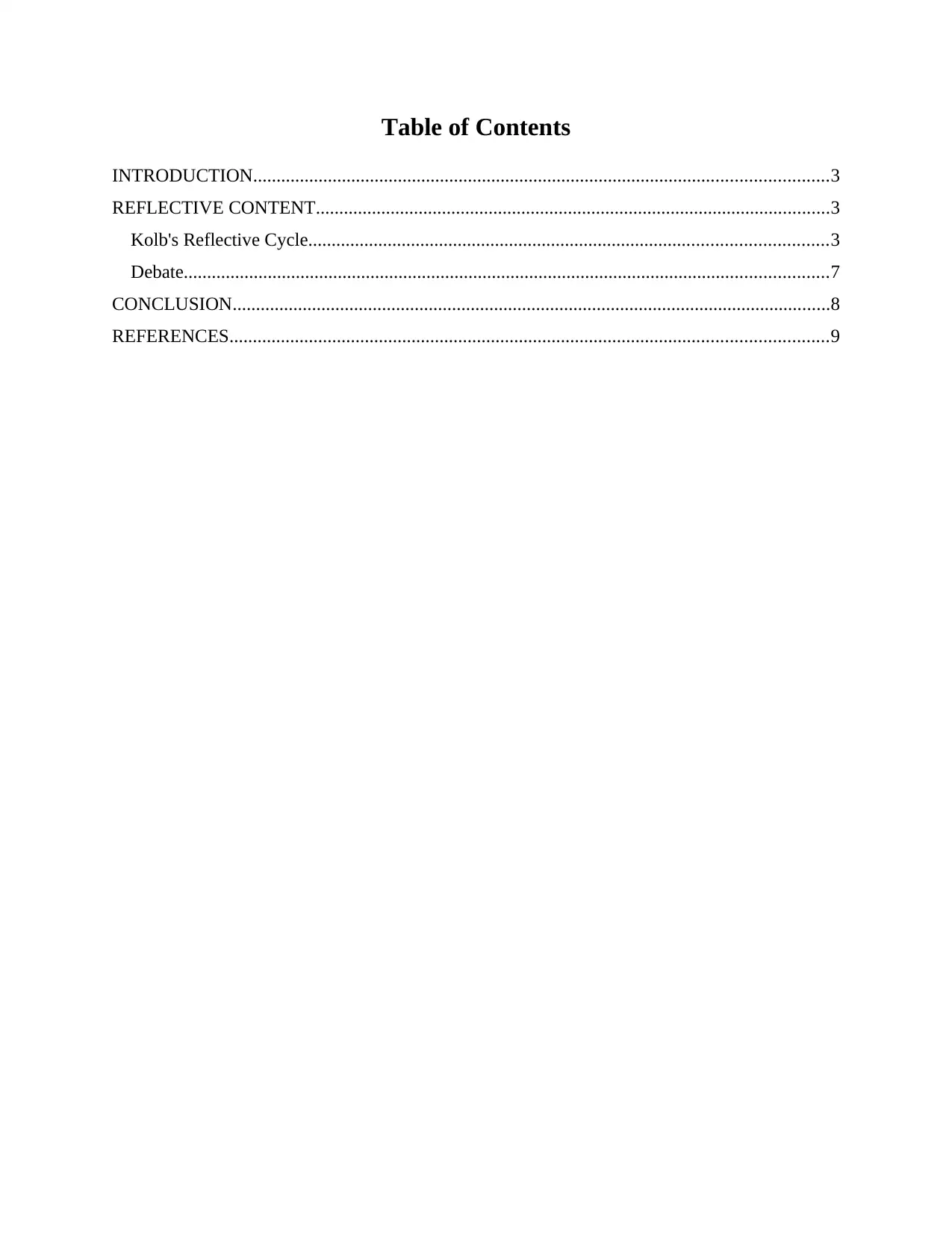
Table of Contents
INTRODUCTION...........................................................................................................................3
REFLECTIVE CONTENT..............................................................................................................3
Kolb's Reflective Cycle...............................................................................................................3
Debate..........................................................................................................................................7
CONCLUSION................................................................................................................................8
REFERENCES................................................................................................................................9
INTRODUCTION...........................................................................................................................3
REFLECTIVE CONTENT..............................................................................................................3
Kolb's Reflective Cycle...............................................................................................................3
Debate..........................................................................................................................................7
CONCLUSION................................................................................................................................8
REFERENCES................................................................................................................................9
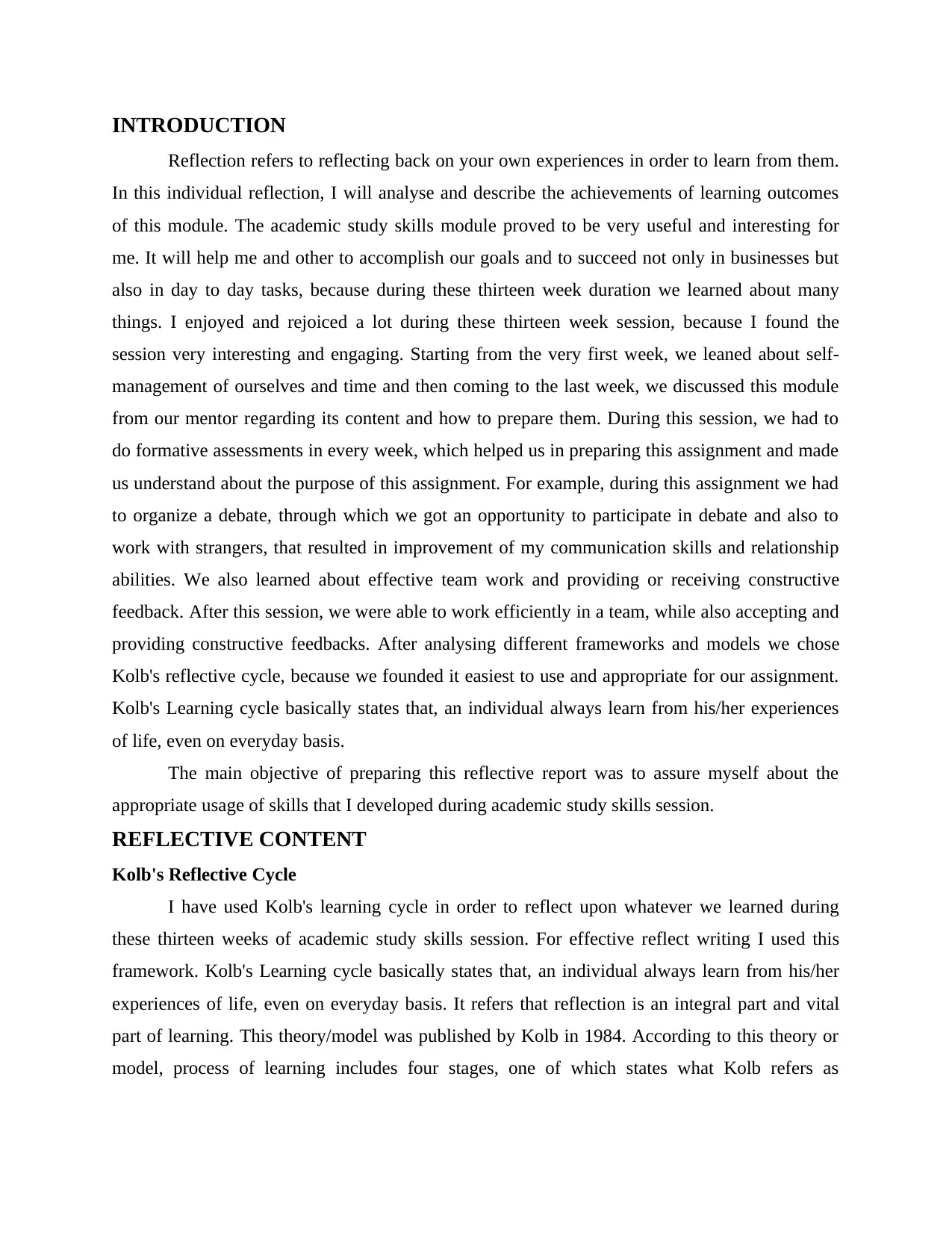
INTRODUCTION
Reflection refers to reflecting back on your own experiences in order to learn from them.
In this individual reflection, I will analyse and describe the achievements of learning outcomes
of this module. The academic study skills module proved to be very useful and interesting for
me. It will help me and other to accomplish our goals and to succeed not only in businesses but
also in day to day tasks, because during these thirteen week duration we learned about many
things. I enjoyed and rejoiced a lot during these thirteen week session, because I found the
session very interesting and engaging. Starting from the very first week, we leaned about self-
management of ourselves and time and then coming to the last week, we discussed this module
from our mentor regarding its content and how to prepare them. During this session, we had to
do formative assessments in every week, which helped us in preparing this assignment and made
us understand about the purpose of this assignment. For example, during this assignment we had
to organize a debate, through which we got an opportunity to participate in debate and also to
work with strangers, that resulted in improvement of my communication skills and relationship
abilities. We also learned about effective team work and providing or receiving constructive
feedback. After this session, we were able to work efficiently in a team, while also accepting and
providing constructive feedbacks. After analysing different frameworks and models we chose
Kolb's reflective cycle, because we founded it easiest to use and appropriate for our assignment.
Kolb's Learning cycle basically states that, an individual always learn from his/her experiences
of life, even on everyday basis.
The main objective of preparing this reflective report was to assure myself about the
appropriate usage of skills that I developed during academic study skills session.
REFLECTIVE CONTENT
Kolb's Reflective Cycle
I have used Kolb's learning cycle in order to reflect upon whatever we learned during
these thirteen weeks of academic study skills session. For effective reflect writing I used this
framework. Kolb's Learning cycle basically states that, an individual always learn from his/her
experiences of life, even on everyday basis. It refers that reflection is an integral part and vital
part of learning. This theory/model was published by Kolb in 1984. According to this theory or
model, process of learning includes four stages, one of which states what Kolb refers as
Reflection refers to reflecting back on your own experiences in order to learn from them.
In this individual reflection, I will analyse and describe the achievements of learning outcomes
of this module. The academic study skills module proved to be very useful and interesting for
me. It will help me and other to accomplish our goals and to succeed not only in businesses but
also in day to day tasks, because during these thirteen week duration we learned about many
things. I enjoyed and rejoiced a lot during these thirteen week session, because I found the
session very interesting and engaging. Starting from the very first week, we leaned about self-
management of ourselves and time and then coming to the last week, we discussed this module
from our mentor regarding its content and how to prepare them. During this session, we had to
do formative assessments in every week, which helped us in preparing this assignment and made
us understand about the purpose of this assignment. For example, during this assignment we had
to organize a debate, through which we got an opportunity to participate in debate and also to
work with strangers, that resulted in improvement of my communication skills and relationship
abilities. We also learned about effective team work and providing or receiving constructive
feedback. After this session, we were able to work efficiently in a team, while also accepting and
providing constructive feedbacks. After analysing different frameworks and models we chose
Kolb's reflective cycle, because we founded it easiest to use and appropriate for our assignment.
Kolb's Learning cycle basically states that, an individual always learn from his/her experiences
of life, even on everyday basis.
The main objective of preparing this reflective report was to assure myself about the
appropriate usage of skills that I developed during academic study skills session.
REFLECTIVE CONTENT
Kolb's Reflective Cycle
I have used Kolb's learning cycle in order to reflect upon whatever we learned during
these thirteen weeks of academic study skills session. For effective reflect writing I used this
framework. Kolb's Learning cycle basically states that, an individual always learn from his/her
experiences of life, even on everyday basis. It refers that reflection is an integral part and vital
part of learning. This theory/model was published by Kolb in 1984. According to this theory or
model, process of learning includes four stages, one of which states what Kolb refers as
⊘ This is a preview!⊘
Do you want full access?
Subscribe today to unlock all pages.

Trusted by 1+ million students worldwide
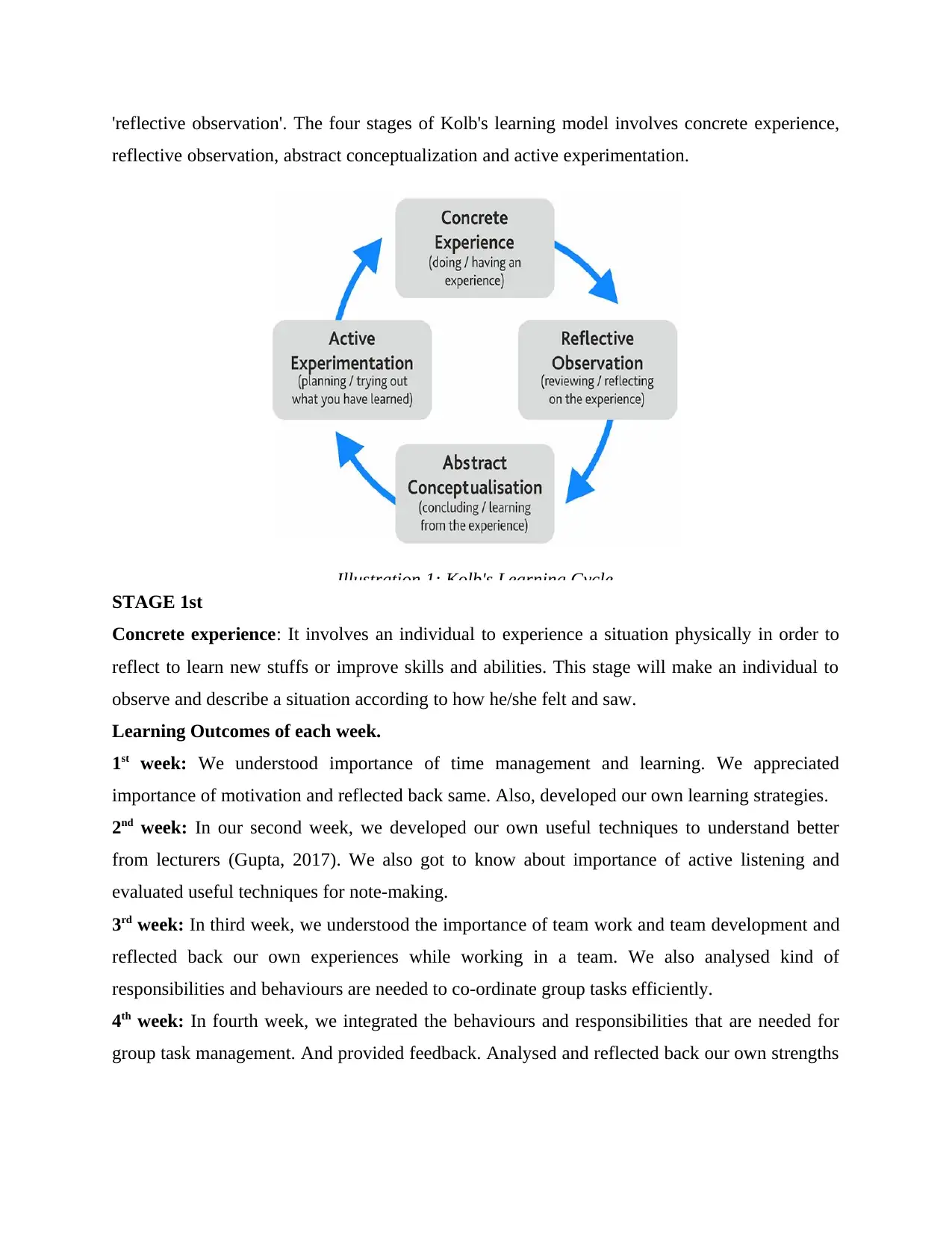
'reflective observation'. The four stages of Kolb's learning model involves concrete experience,
reflective observation, abstract conceptualization and active experimentation.
STAGE 1st
Concrete experience: It involves an individual to experience a situation physically in order to
reflect to learn new stuffs or improve skills and abilities. This stage will make an individual to
observe and describe a situation according to how he/she felt and saw.
Learning Outcomes of each week.
1st week: We understood importance of time management and learning. We appreciated
importance of motivation and reflected back same. Also, developed our own learning strategies.
2nd week: In our second week, we developed our own useful techniques to understand better
from lecturers (Gupta, 2017). We also got to know about importance of active listening and
evaluated useful techniques for note-making.
3rd week: In third week, we understood the importance of team work and team development and
reflected back our own experiences while working in a team. We also analysed kind of
responsibilities and behaviours are needed to co-ordinate group tasks efficiently.
4th week: In fourth week, we integrated the behaviours and responsibilities that are needed for
group task management. And provided feedback. Analysed and reflected back our own strengths
Illustration 1: Kolb's Learning Cycle
reflective observation, abstract conceptualization and active experimentation.
STAGE 1st
Concrete experience: It involves an individual to experience a situation physically in order to
reflect to learn new stuffs or improve skills and abilities. This stage will make an individual to
observe and describe a situation according to how he/she felt and saw.
Learning Outcomes of each week.
1st week: We understood importance of time management and learning. We appreciated
importance of motivation and reflected back same. Also, developed our own learning strategies.
2nd week: In our second week, we developed our own useful techniques to understand better
from lecturers (Gupta, 2017). We also got to know about importance of active listening and
evaluated useful techniques for note-making.
3rd week: In third week, we understood the importance of team work and team development and
reflected back our own experiences while working in a team. We also analysed kind of
responsibilities and behaviours are needed to co-ordinate group tasks efficiently.
4th week: In fourth week, we integrated the behaviours and responsibilities that are needed for
group task management. And provided feedback. Analysed and reflected back our own strengths
Illustration 1: Kolb's Learning Cycle
Paraphrase This Document
Need a fresh take? Get an instant paraphrase of this document with our AI Paraphraser
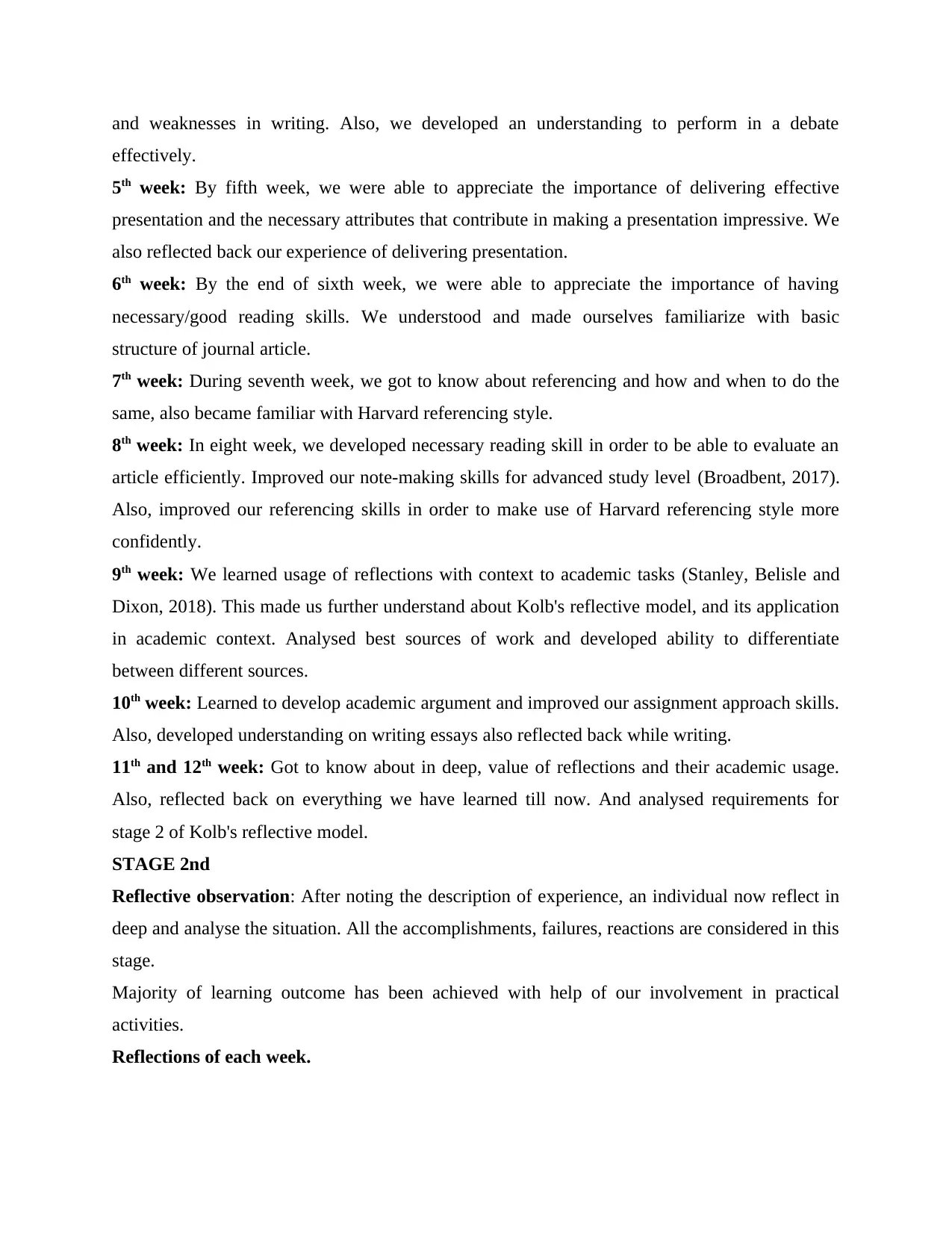
and weaknesses in writing. Also, we developed an understanding to perform in a debate
effectively.
5th week: By fifth week, we were able to appreciate the importance of delivering effective
presentation and the necessary attributes that contribute in making a presentation impressive. We
also reflected back our experience of delivering presentation.
6th week: By the end of sixth week, we were able to appreciate the importance of having
necessary/good reading skills. We understood and made ourselves familiarize with basic
structure of journal article.
7th week: During seventh week, we got to know about referencing and how and when to do the
same, also became familiar with Harvard referencing style.
8th week: In eight week, we developed necessary reading skill in order to be able to evaluate an
article efficiently. Improved our note-making skills for advanced study level (Broadbent, 2017).
Also, improved our referencing skills in order to make use of Harvard referencing style more
confidently.
9th week: We learned usage of reflections with context to academic tasks (Stanley, Belisle and
Dixon, 2018). This made us further understand about Kolb's reflective model, and its application
in academic context. Analysed best sources of work and developed ability to differentiate
between different sources.
10th week: Learned to develop academic argument and improved our assignment approach skills.
Also, developed understanding on writing essays also reflected back while writing.
11th and 12th week: Got to know about in deep, value of reflections and their academic usage.
Also, reflected back on everything we have learned till now. And analysed requirements for
stage 2 of Kolb's reflective model.
STAGE 2nd
Reflective observation: After noting the description of experience, an individual now reflect in
deep and analyse the situation. All the accomplishments, failures, reactions are considered in this
stage.
Majority of learning outcome has been achieved with help of our involvement in practical
activities.
Reflections of each week.
effectively.
5th week: By fifth week, we were able to appreciate the importance of delivering effective
presentation and the necessary attributes that contribute in making a presentation impressive. We
also reflected back our experience of delivering presentation.
6th week: By the end of sixth week, we were able to appreciate the importance of having
necessary/good reading skills. We understood and made ourselves familiarize with basic
structure of journal article.
7th week: During seventh week, we got to know about referencing and how and when to do the
same, also became familiar with Harvard referencing style.
8th week: In eight week, we developed necessary reading skill in order to be able to evaluate an
article efficiently. Improved our note-making skills for advanced study level (Broadbent, 2017).
Also, improved our referencing skills in order to make use of Harvard referencing style more
confidently.
9th week: We learned usage of reflections with context to academic tasks (Stanley, Belisle and
Dixon, 2018). This made us further understand about Kolb's reflective model, and its application
in academic context. Analysed best sources of work and developed ability to differentiate
between different sources.
10th week: Learned to develop academic argument and improved our assignment approach skills.
Also, developed understanding on writing essays also reflected back while writing.
11th and 12th week: Got to know about in deep, value of reflections and their academic usage.
Also, reflected back on everything we have learned till now. And analysed requirements for
stage 2 of Kolb's reflective model.
STAGE 2nd
Reflective observation: After noting the description of experience, an individual now reflect in
deep and analyse the situation. All the accomplishments, failures, reactions are considered in this
stage.
Majority of learning outcome has been achieved with help of our involvement in practical
activities.
Reflections of each week.
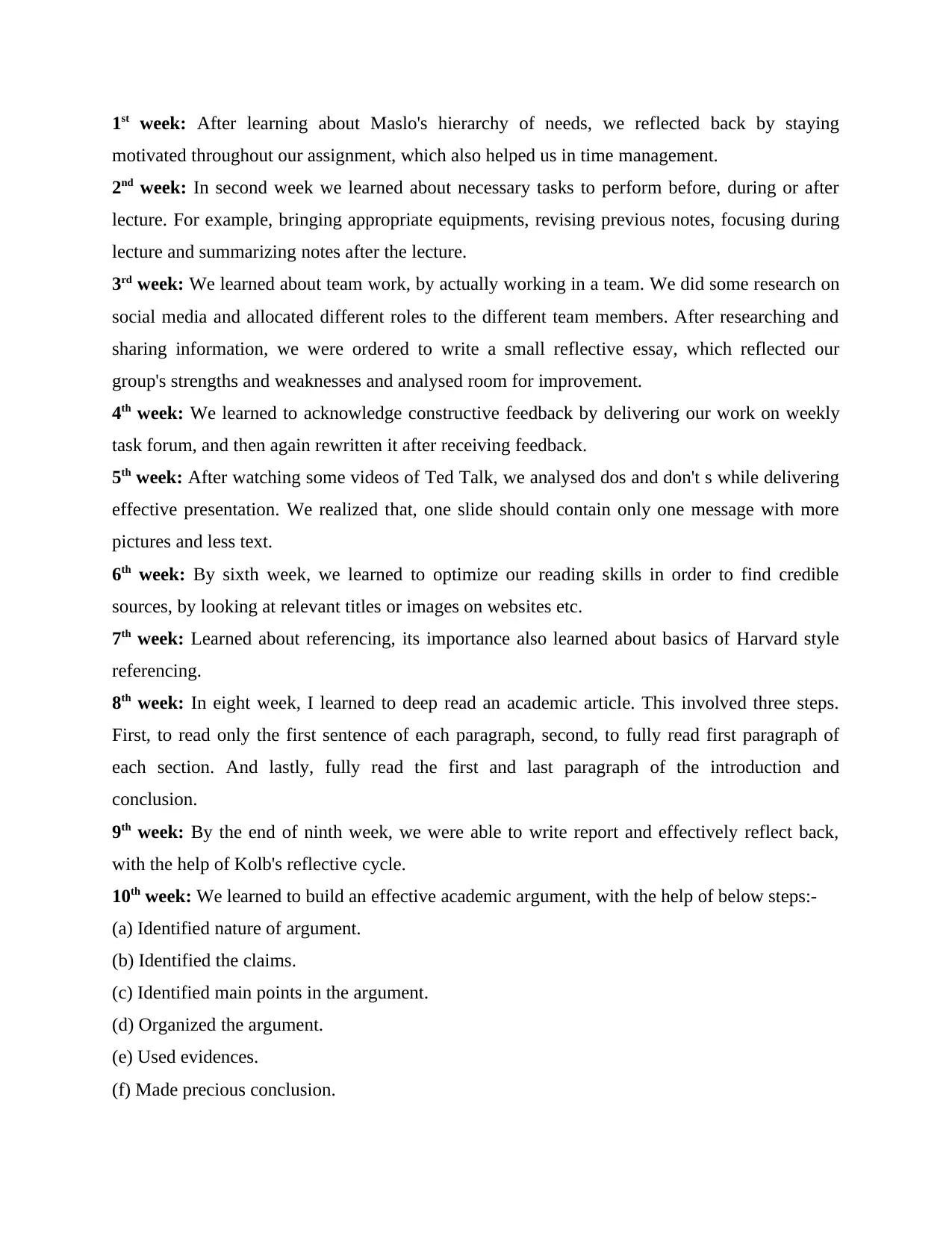
1st week: After learning about Maslo's hierarchy of needs, we reflected back by staying
motivated throughout our assignment, which also helped us in time management.
2nd week: In second week we learned about necessary tasks to perform before, during or after
lecture. For example, bringing appropriate equipments, revising previous notes, focusing during
lecture and summarizing notes after the lecture.
3rd week: We learned about team work, by actually working in a team. We did some research on
social media and allocated different roles to the different team members. After researching and
sharing information, we were ordered to write a small reflective essay, which reflected our
group's strengths and weaknesses and analysed room for improvement.
4th week: We learned to acknowledge constructive feedback by delivering our work on weekly
task forum, and then again rewritten it after receiving feedback.
5th week: After watching some videos of Ted Talk, we analysed dos and don't s while delivering
effective presentation. We realized that, one slide should contain only one message with more
pictures and less text.
6th week: By sixth week, we learned to optimize our reading skills in order to find credible
sources, by looking at relevant titles or images on websites etc.
7th week: Learned about referencing, its importance also learned about basics of Harvard style
referencing.
8th week: In eight week, I learned to deep read an academic article. This involved three steps.
First, to read only the first sentence of each paragraph, second, to fully read first paragraph of
each section. And lastly, fully read the first and last paragraph of the introduction and
conclusion.
9th week: By the end of ninth week, we were able to write report and effectively reflect back,
with the help of Kolb's reflective cycle.
10th week: We learned to build an effective academic argument, with the help of below steps:-
(a) Identified nature of argument.
(b) Identified the claims.
(c) Identified main points in the argument.
(d) Organized the argument.
(e) Used evidences.
(f) Made precious conclusion.
motivated throughout our assignment, which also helped us in time management.
2nd week: In second week we learned about necessary tasks to perform before, during or after
lecture. For example, bringing appropriate equipments, revising previous notes, focusing during
lecture and summarizing notes after the lecture.
3rd week: We learned about team work, by actually working in a team. We did some research on
social media and allocated different roles to the different team members. After researching and
sharing information, we were ordered to write a small reflective essay, which reflected our
group's strengths and weaknesses and analysed room for improvement.
4th week: We learned to acknowledge constructive feedback by delivering our work on weekly
task forum, and then again rewritten it after receiving feedback.
5th week: After watching some videos of Ted Talk, we analysed dos and don't s while delivering
effective presentation. We realized that, one slide should contain only one message with more
pictures and less text.
6th week: By sixth week, we learned to optimize our reading skills in order to find credible
sources, by looking at relevant titles or images on websites etc.
7th week: Learned about referencing, its importance also learned about basics of Harvard style
referencing.
8th week: In eight week, I learned to deep read an academic article. This involved three steps.
First, to read only the first sentence of each paragraph, second, to fully read first paragraph of
each section. And lastly, fully read the first and last paragraph of the introduction and
conclusion.
9th week: By the end of ninth week, we were able to write report and effectively reflect back,
with the help of Kolb's reflective cycle.
10th week: We learned to build an effective academic argument, with the help of below steps:-
(a) Identified nature of argument.
(b) Identified the claims.
(c) Identified main points in the argument.
(d) Organized the argument.
(e) Used evidences.
(f) Made precious conclusion.
⊘ This is a preview!⊘
Do you want full access?
Subscribe today to unlock all pages.

Trusted by 1+ million students worldwide
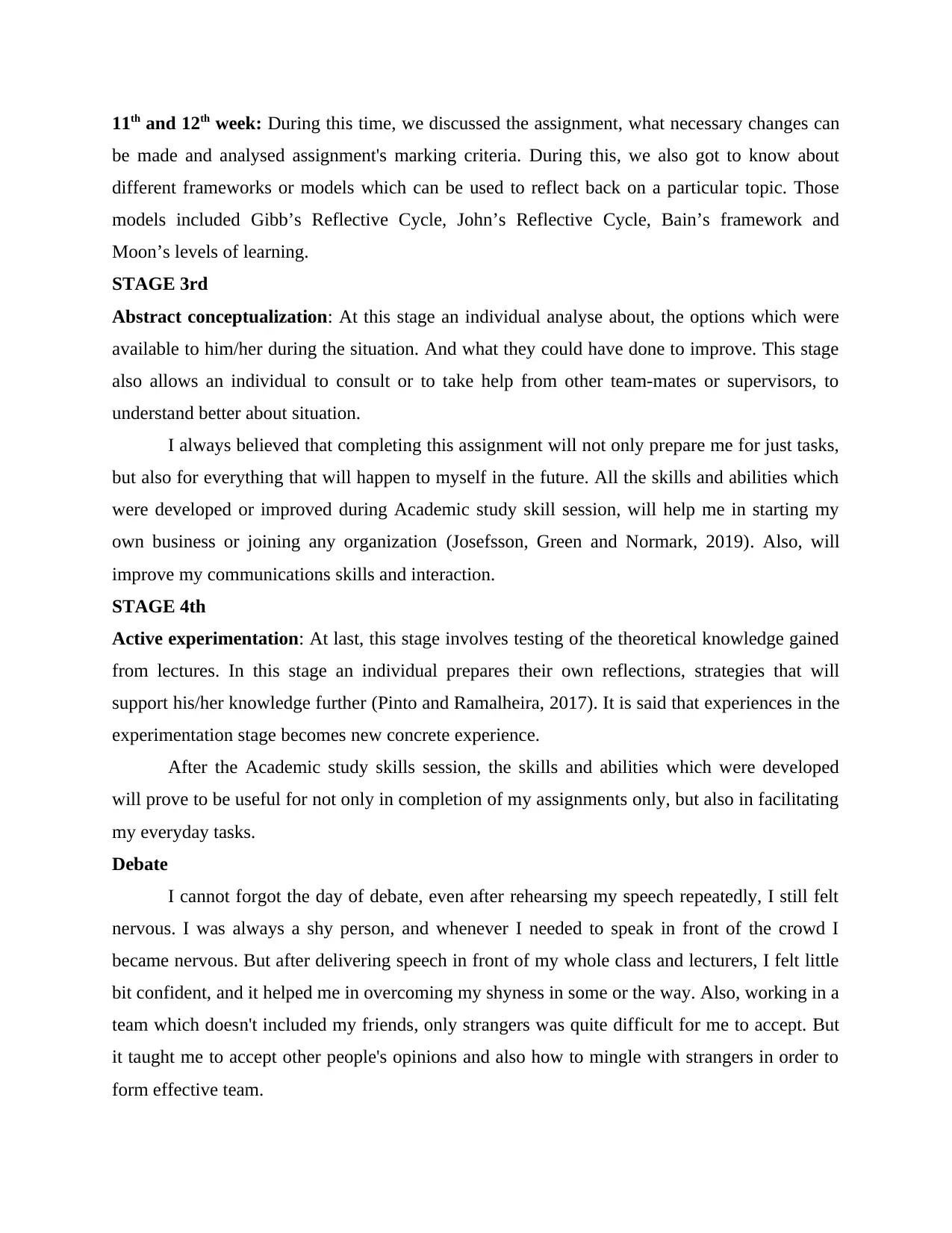
11th and 12th week: During this time, we discussed the assignment, what necessary changes can
be made and analysed assignment's marking criteria. During this, we also got to know about
different frameworks or models which can be used to reflect back on a particular topic. Those
models included Gibb’s Reflective Cycle, John’s Reflective Cycle, Bain’s framework and
Moon’s levels of learning.
STAGE 3rd
Abstract conceptualization: At this stage an individual analyse about, the options which were
available to him/her during the situation. And what they could have done to improve. This stage
also allows an individual to consult or to take help from other team-mates or supervisors, to
understand better about situation.
I always believed that completing this assignment will not only prepare me for just tasks,
but also for everything that will happen to myself in the future. All the skills and abilities which
were developed or improved during Academic study skill session, will help me in starting my
own business or joining any organization (Josefsson, Green and Normark, 2019). Also, will
improve my communications skills and interaction.
STAGE 4th
Active experimentation: At last, this stage involves testing of the theoretical knowledge gained
from lectures. In this stage an individual prepares their own reflections, strategies that will
support his/her knowledge further (Pinto and Ramalheira, 2017). It is said that experiences in the
experimentation stage becomes new concrete experience.
After the Academic study skills session, the skills and abilities which were developed
will prove to be useful for not only in completion of my assignments only, but also in facilitating
my everyday tasks.
Debate
I cannot forgot the day of debate, even after rehearsing my speech repeatedly, I still felt
nervous. I was always a shy person, and whenever I needed to speak in front of the crowd I
became nervous. But after delivering speech in front of my whole class and lecturers, I felt little
bit confident, and it helped me in overcoming my shyness in some or the way. Also, working in a
team which doesn't included my friends, only strangers was quite difficult for me to accept. But
it taught me to accept other people's opinions and also how to mingle with strangers in order to
form effective team.
be made and analysed assignment's marking criteria. During this, we also got to know about
different frameworks or models which can be used to reflect back on a particular topic. Those
models included Gibb’s Reflective Cycle, John’s Reflective Cycle, Bain’s framework and
Moon’s levels of learning.
STAGE 3rd
Abstract conceptualization: At this stage an individual analyse about, the options which were
available to him/her during the situation. And what they could have done to improve. This stage
also allows an individual to consult or to take help from other team-mates or supervisors, to
understand better about situation.
I always believed that completing this assignment will not only prepare me for just tasks,
but also for everything that will happen to myself in the future. All the skills and abilities which
were developed or improved during Academic study skill session, will help me in starting my
own business or joining any organization (Josefsson, Green and Normark, 2019). Also, will
improve my communications skills and interaction.
STAGE 4th
Active experimentation: At last, this stage involves testing of the theoretical knowledge gained
from lectures. In this stage an individual prepares their own reflections, strategies that will
support his/her knowledge further (Pinto and Ramalheira, 2017). It is said that experiences in the
experimentation stage becomes new concrete experience.
After the Academic study skills session, the skills and abilities which were developed
will prove to be useful for not only in completion of my assignments only, but also in facilitating
my everyday tasks.
Debate
I cannot forgot the day of debate, even after rehearsing my speech repeatedly, I still felt
nervous. I was always a shy person, and whenever I needed to speak in front of the crowd I
became nervous. But after delivering speech in front of my whole class and lecturers, I felt little
bit confident, and it helped me in overcoming my shyness in some or the way. Also, working in a
team which doesn't included my friends, only strangers was quite difficult for me to accept. But
it taught me to accept other people's opinions and also how to mingle with strangers in order to
form effective team.
Paraphrase This Document
Need a fresh take? Get an instant paraphrase of this document with our AI Paraphraser
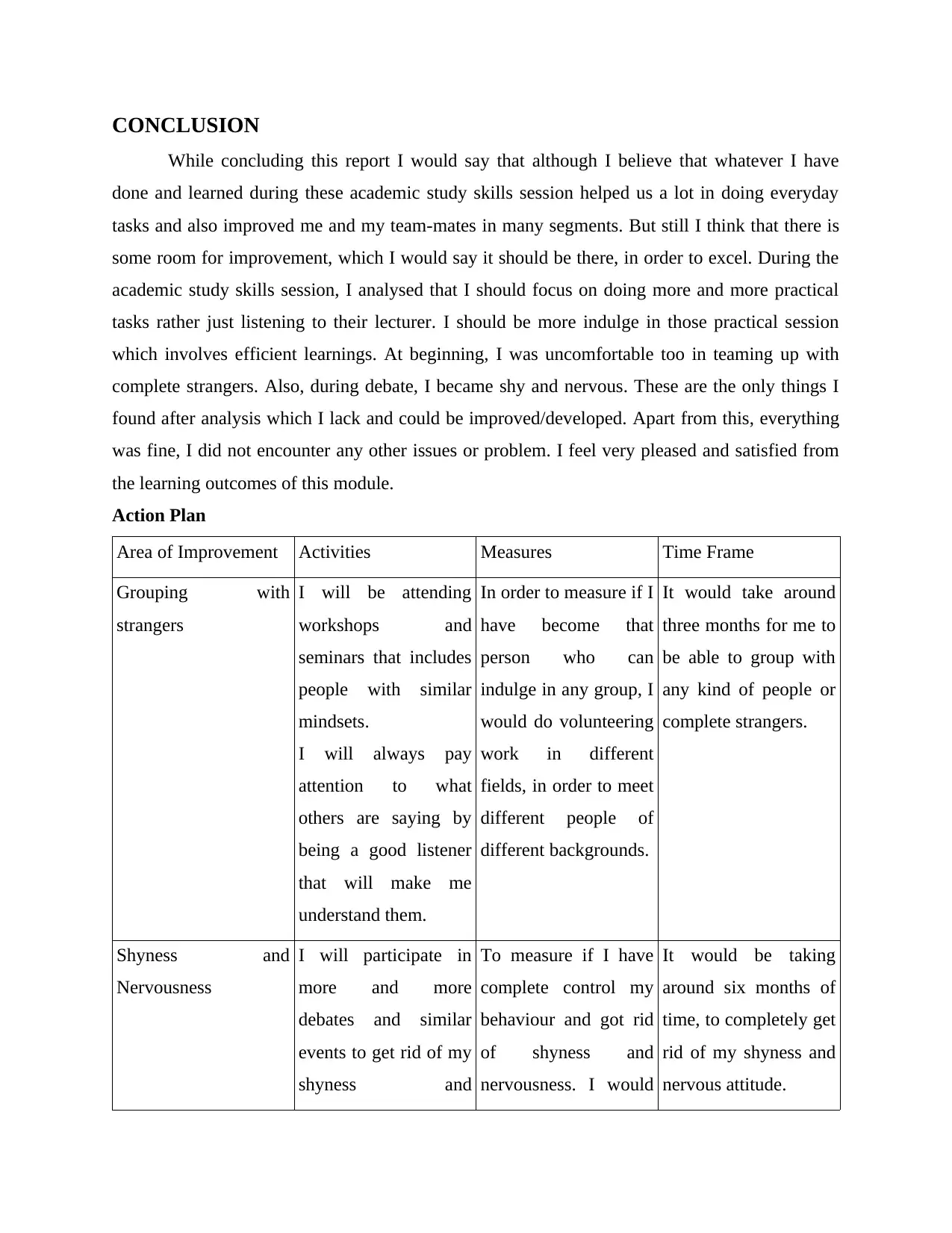
CONCLUSION
While concluding this report I would say that although I believe that whatever I have
done and learned during these academic study skills session helped us a lot in doing everyday
tasks and also improved me and my team-mates in many segments. But still I think that there is
some room for improvement, which I would say it should be there, in order to excel. During the
academic study skills session, I analysed that I should focus on doing more and more practical
tasks rather just listening to their lecturer. I should be more indulge in those practical session
which involves efficient learnings. At beginning, I was uncomfortable too in teaming up with
complete strangers. Also, during debate, I became shy and nervous. These are the only things I
found after analysis which I lack and could be improved/developed. Apart from this, everything
was fine, I did not encounter any other issues or problem. I feel very pleased and satisfied from
the learning outcomes of this module.
Action Plan
Area of Improvement Activities Measures Time Frame
Grouping with
strangers
I will be attending
workshops and
seminars that includes
people with similar
mindsets.
I will always pay
attention to what
others are saying by
being a good listener
that will make me
understand them.
In order to measure if I
have become that
person who can
indulge in any group, I
would do volunteering
work in different
fields, in order to meet
different people of
different backgrounds.
It would take around
three months for me to
be able to group with
any kind of people or
complete strangers.
Shyness and
Nervousness
I will participate in
more and more
debates and similar
events to get rid of my
shyness and
To measure if I have
complete control my
behaviour and got rid
of shyness and
nervousness. I would
It would be taking
around six months of
time, to completely get
rid of my shyness and
nervous attitude.
While concluding this report I would say that although I believe that whatever I have
done and learned during these academic study skills session helped us a lot in doing everyday
tasks and also improved me and my team-mates in many segments. But still I think that there is
some room for improvement, which I would say it should be there, in order to excel. During the
academic study skills session, I analysed that I should focus on doing more and more practical
tasks rather just listening to their lecturer. I should be more indulge in those practical session
which involves efficient learnings. At beginning, I was uncomfortable too in teaming up with
complete strangers. Also, during debate, I became shy and nervous. These are the only things I
found after analysis which I lack and could be improved/developed. Apart from this, everything
was fine, I did not encounter any other issues or problem. I feel very pleased and satisfied from
the learning outcomes of this module.
Action Plan
Area of Improvement Activities Measures Time Frame
Grouping with
strangers
I will be attending
workshops and
seminars that includes
people with similar
mindsets.
I will always pay
attention to what
others are saying by
being a good listener
that will make me
understand them.
In order to measure if I
have become that
person who can
indulge in any group, I
would do volunteering
work in different
fields, in order to meet
different people of
different backgrounds.
It would take around
three months for me to
be able to group with
any kind of people or
complete strangers.
Shyness and
Nervousness
I will participate in
more and more
debates and similar
events to get rid of my
shyness and
To measure if I have
complete control my
behaviour and got rid
of shyness and
nervousness. I would
It would be taking
around six months of
time, to completely get
rid of my shyness and
nervous attitude.
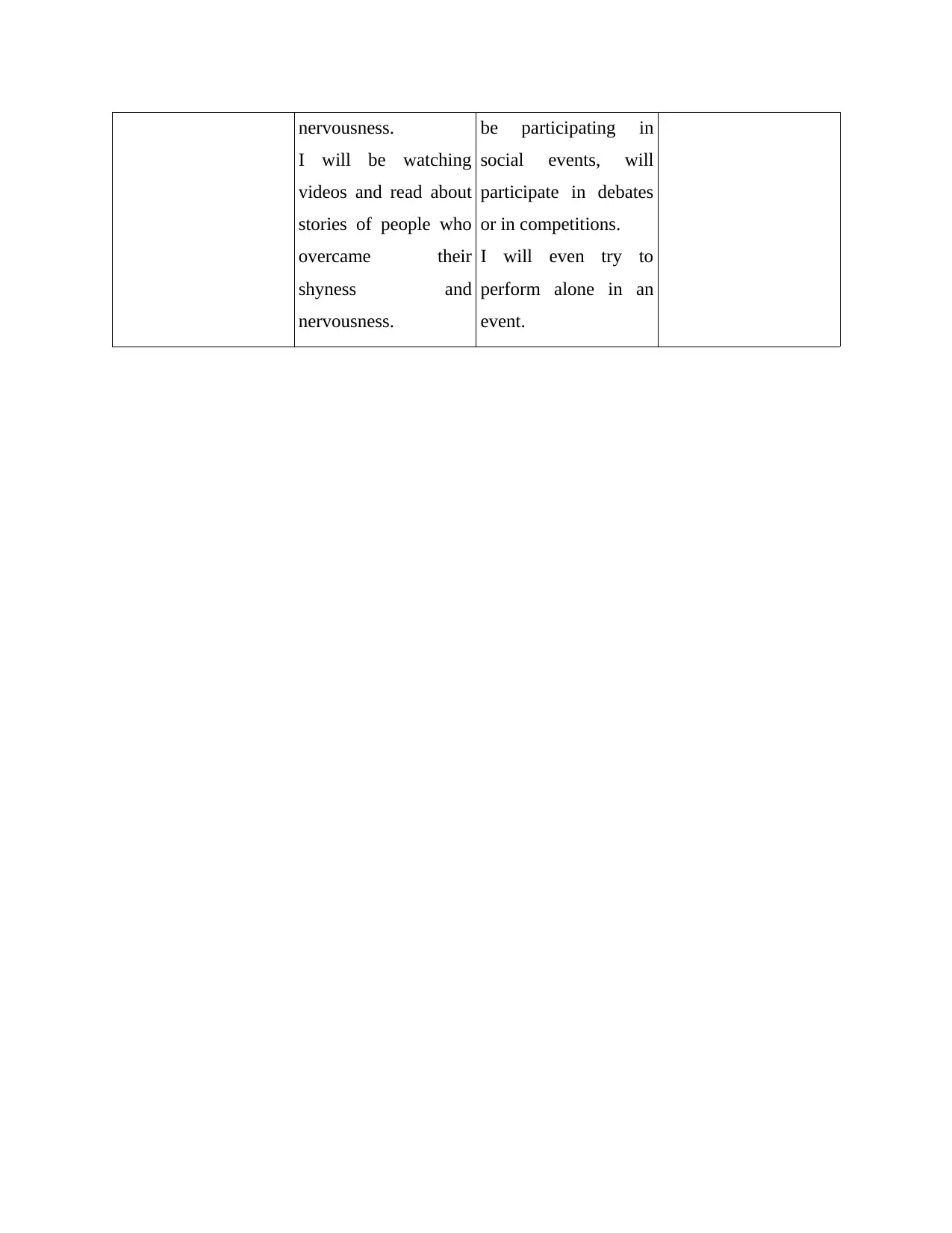
nervousness.
I will be watching
videos and read about
stories of people who
overcame their
shyness and
nervousness.
be participating in
social events, will
participate in debates
or in competitions.
I will even try to
perform alone in an
event.
I will be watching
videos and read about
stories of people who
overcame their
shyness and
nervousness.
be participating in
social events, will
participate in debates
or in competitions.
I will even try to
perform alone in an
event.
⊘ This is a preview!⊘
Do you want full access?
Subscribe today to unlock all pages.

Trusted by 1+ million students worldwide
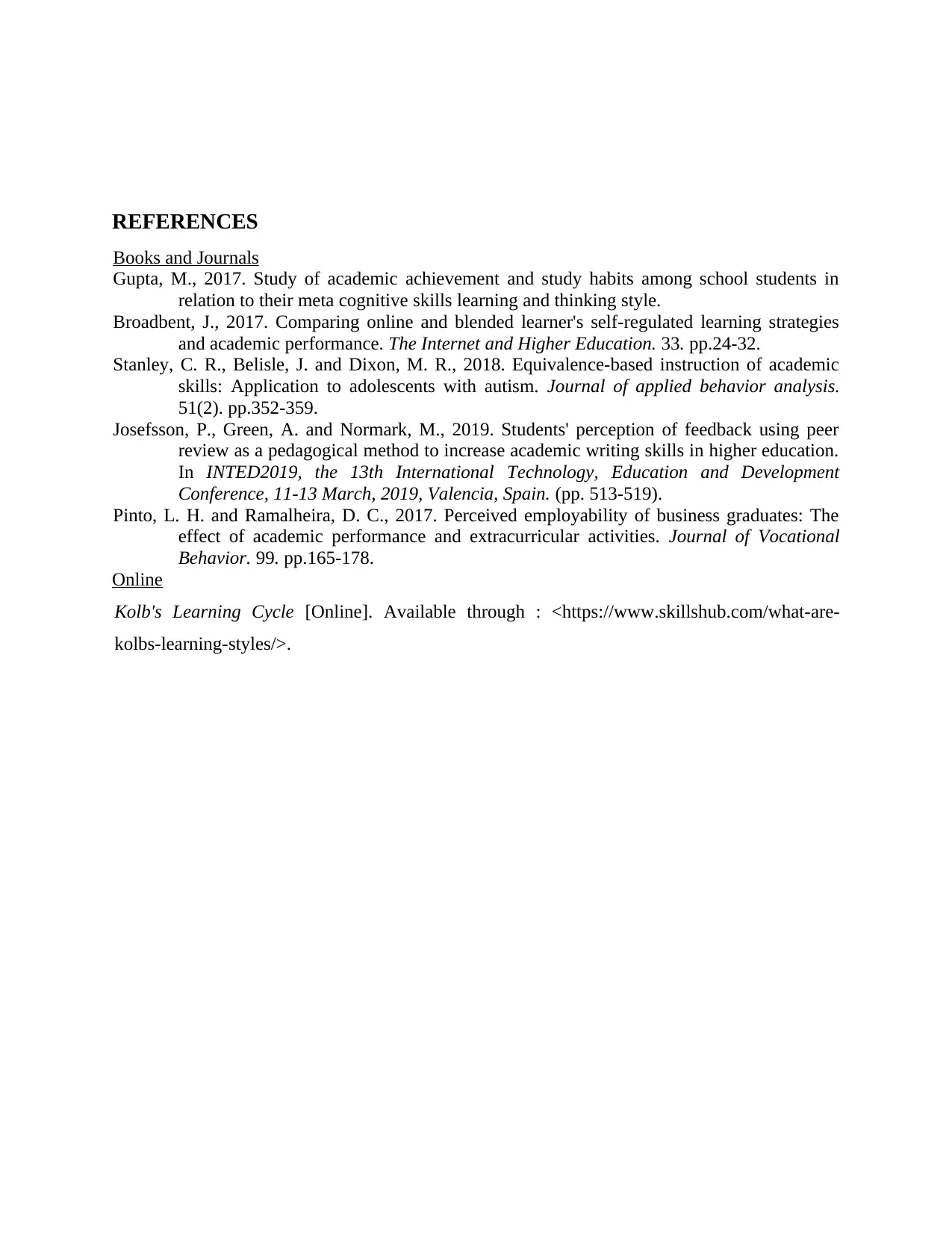
REFERENCES
Books and Journals
Gupta, M., 2017. Study of academic achievement and study habits among school students in
relation to their meta cognitive skills learning and thinking style.
Broadbent, J., 2017. Comparing online and blended learner's self-regulated learning strategies
and academic performance. The Internet and Higher Education. 33. pp.24-32.
Stanley, C. R., Belisle, J. and Dixon, M. R., 2018. Equivalence‐based instruction of academic
skills: Application to adolescents with autism. Journal of applied behavior analysis.
51(2). pp.352-359.
Josefsson, P., Green, A. and Normark, M., 2019. Students' perception of feedback using peer
review as a pedagogical method to increase academic writing skills in higher education.
In INTED2019, the 13th International Technology, Education and Development
Conference, 11-13 March, 2019, Valencia, Spain. (pp. 513-519).
Pinto, L. H. and Ramalheira, D. C., 2017. Perceived employability of business graduates: The
effect of academic performance and extracurricular activities. Journal of Vocational
Behavior. 99. pp.165-178.
Online
Kolb's Learning Cycle [Online]. Available through : <https://www.skillshub.com/what-are-
kolbs-learning-styles/>.
Books and Journals
Gupta, M., 2017. Study of academic achievement and study habits among school students in
relation to their meta cognitive skills learning and thinking style.
Broadbent, J., 2017. Comparing online and blended learner's self-regulated learning strategies
and academic performance. The Internet and Higher Education. 33. pp.24-32.
Stanley, C. R., Belisle, J. and Dixon, M. R., 2018. Equivalence‐based instruction of academic
skills: Application to adolescents with autism. Journal of applied behavior analysis.
51(2). pp.352-359.
Josefsson, P., Green, A. and Normark, M., 2019. Students' perception of feedback using peer
review as a pedagogical method to increase academic writing skills in higher education.
In INTED2019, the 13th International Technology, Education and Development
Conference, 11-13 March, 2019, Valencia, Spain. (pp. 513-519).
Pinto, L. H. and Ramalheira, D. C., 2017. Perceived employability of business graduates: The
effect of academic performance and extracurricular activities. Journal of Vocational
Behavior. 99. pp.165-178.
Online
Kolb's Learning Cycle [Online]. Available through : <https://www.skillshub.com/what-are-
kolbs-learning-styles/>.
1 out of 10
Related Documents
Your All-in-One AI-Powered Toolkit for Academic Success.
+13062052269
info@desklib.com
Available 24*7 on WhatsApp / Email
![[object Object]](/_next/static/media/star-bottom.7253800d.svg)
Unlock your academic potential
Copyright © 2020–2026 A2Z Services. All Rights Reserved. Developed and managed by ZUCOL.


